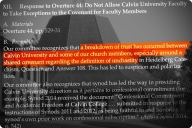You have /5 articles left.
Sign up for a free account or log in.
Does tenure really exist at seminaries?
That's the question that Jimmy Kirby hopes to clarify with his lawsuit against the Lexington Theological Seminary. Kirby lost his job as a tenured professor there in 2009, when he was among a group of faculty members who were subject to layoffs after the seminary declared financial exigency. Kirby, who is black, believes that the seminary's financial problems were used as a pretext, and that he was actually the victim of racial discrimination. He sued in Kentucky court.
Kirby has not had a chance to present evidence in his case, however, because a Kentucky judge accepted the seminary's argument that it was exempt from all employment suits under the doctrine of "ecclesiastical abstention." Kirby is appealing, and his lawyer argues that if the seminary is able to evade the suit, tenure protections will be simply theoretical at the institution and others that may invoke the theory.
"Ecclesiastical abstention" and "ministerial exception" are legal phrases that describe the longstanding position of courts in the United States against deciding matters that relate to the organization of churches or religious groups, or to issues of theology. Under this doctrine, courts almost never would hear a suit by a member of the clergy against his or her denomination or a religious body, for instance. The idea behind the legal theory is that it would be difficult for courts to resolve such matters without passing judgment on what are essentially religious decisions -- and that such involvement by the courts would cross the line that separates church and state.
The issue Kirby is appealing concerns how far that theory should be applied.
Kirby's appeal argues that Lexington Theological Seminary should not have been given the right to invoke "ecclesiastical abstention" in his case for several reasons. First, Kirby is not a member of the clergy. Second, his faith (Christian Methodist Episcopal) is not the same as that of the seminary (Disciples of Christ). Third, issues of religion and theology are not in play, since the seminary says it dismissed Kirby because of financial difficulties and he maintains he was let go out of racial discrimination.
Amos N. Jones, Kirby's lawyer, said that if a seminary can fire anyone for any reason, without any fear of legal ramifications by virtue of the ministerial exception, then "no one has rights" at those seminaries -- and that includes tenured professors.
Jim Johnson, president of Lexington, declined to comment on the case, saying that the seminary does not discuss any pending litigation.
Daniel O. Aleshire, executive director of the Association of Theological Schools, said that the group's members that are controlled by a denomination believe that they do have the right to invoke the ministerial exception -- regardless of the nature of the position or individual involved in any litigation that the seminaries wish to end. He said that theology programs that are nondenominational have had more difficulty doing so.
But "if you can show ecclesiastical control," he said, seminaries believe that any employment disputes should "be treated as a church matter," and not adjudicated by the courts. Aleshire acknowledged that invoking this right could seem "offensive" to many people, but said that it "falls within the prerogative" of the institutions.
Gregory F. Scholtz, who heads the academic freedom office at the American Association of University Professors, said that he did not see how one could have a real tenure system while reserving the right to dismiss faculty members without their having any legal rights. "If a seminary presents itself as an institution of higher education in which the ultimate goal is the search for knowledge and dissemination of knowledge, they cannot at the same time claim they are free to do whatever they wish when it comes to academic freedom and tenure," he said.








